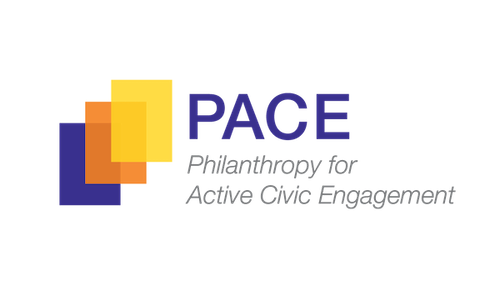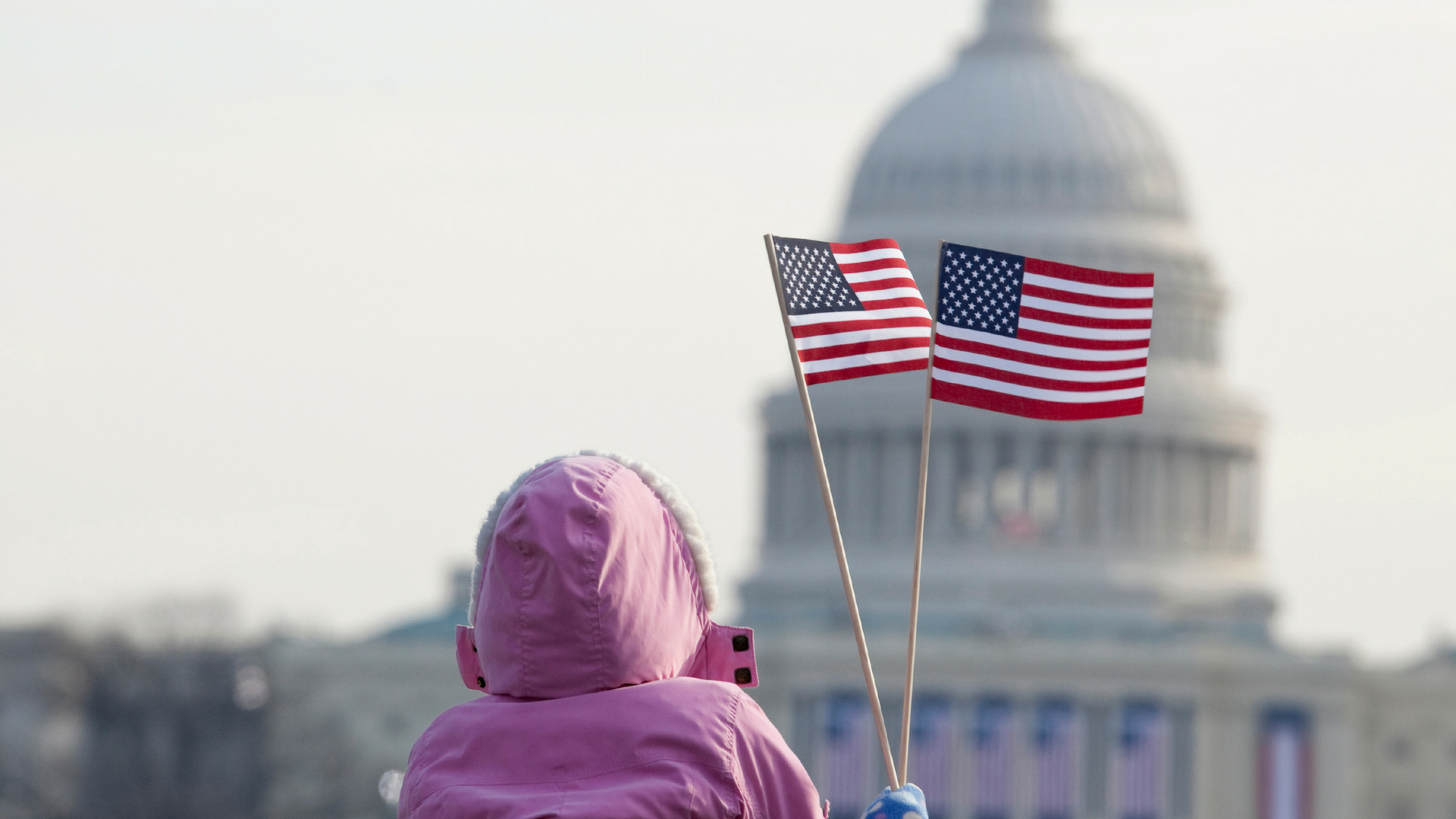
The Experiment
Launched in 2019, Faith In/And Democracy (FIAD) is a funding and learning initiative to explore the ways faith and faith communities support democracy and civic life. PACE leads and administers this initiative because we believe faith can ease divisions that plague our political processes and social fabric.
With contributions from seven grantmakers totaling over $1 million, Faith In/And Democracy was originally a three-year pooled fund, which–to date–has awarded 31 grants to organizations working at the intersection of faith and democracy. The pooled fund also prioritized learning as a co-equal objective. Each year of the initiative, PACE ran a cohort-based, year-long peer Learning Community for those engaged with the initiative. We saw this Learning Community as a “laboratory” to test key questions about learning and impact and reflect those learnings to funders, nonprofits, and other fields more broadly. Our theory of change is that fellowship and collective learning can lead to new understanding and new action for both those who do the work (practitioners and community leaders) and those who support the work (funders and other civic leaders).
FIAD’s Evolution Across Years 1 and 2
In the first year of PACE’s Faith In/And Democracy initiative, we administered a competitive grant process that provided grants to five projects. Through our work as a Learning Community in the first year, we confirmed our hypothesis about the positive impact of faith leaders and organizations to bridge difference and inspire civic engagement. In the second year, we supported six projects, deepened our understanding of the field, and specifically sought to learn about the traits and conditions of faith leaders and institutions that make them effective bridge-builders.
A major learning theme across both years was that philanthropic investment in the faith/democracy field is small compared to the need, opportunities, and potential benefits. A recent Bridgespan report further underscored this as well, and we want to continue inspiring funders and other civic leaders to harness the power and potential of faith and religion as both a force for problem-solving and strengthening democracy writ-large.
FIAD’s Work in Year 3
Throughout all aspects of its work, the initiative engaged this framing question in 2021-2022:
What is the influence of faith communities on democracy and civic life? While we were interested in this question overall, we specifically explored how faith leaders and organizations inspire civic leadership, build civic character, preserve and sustain civil rights, and support/bridge their communities through social and political flashpoints.
To do this, year 3 of the initiative built on its two successful previous years and operated with a two-pronged approach: 1) expand and diversify the FIAD Learning Community and 2) operate the FIAD Fund, a participatory fund to generate new evidence of faith’s influence on democracy and civic life, as guided by the Learning Community.
The Learning Community explored core questions related to the ways faith and faith communities support democracy and civic life and shared its learnings with the civic philanthropy field. Its goals were to:
- collaboratively explore questions about what is needed to advance the practice of faith-inspired democracy work,
- add to the body of knowledge that might inspire investment and promote engagement at the intersection of faith and democracy.
The FIAD Fund supported ideas and projects to generate evidence the Learning Community felt was critical to catalyzing more support for the field of practice (from funders and others). Its goals were to:
- incentivize learning by members of the Learning Community
- support projects that build the evidence case around faith’s role in and influence on democracy and civic life.
In February 2022, we announced the six projects that would be supported through the FIAD Fund. All of the projects supported through this fund tested their own hypotheses about how to advance, strengthen, and innovate on faith’s role in democracy. PACE believes their learning will help produce evidence that can be instructive and actionable for other leaders.We share more details about our journey that brought us to this focus for year 3 in this piece and press release.
FIAD Projects
In each of the first two years of the initiative, PACE administered a competitive grant process that selected organizations running projects at the intersection of faith and democracy. Organizations received grants for their projects and joined a cohort-based Learning Community over the year they were supported. Below, we include the details of the projects that were supported by FIAD in the first two years. To see how the grantmaking evolved in the third year of this initiative, we invite you to read this piece.
2019 – 2020 Projects (Pilot Year)
Faith In Indiana ISAIAH Neighborly Faith Inc. Virginia Interfaith Center for Public Policy Wisconsin Council of Churches2020 – 2021 Projects
America Indivisible Chicago Theological Seminary Fairbanks Climate Action Coalition Faith in Action Alabama NM Comunidades en Acción y de Fe One America MovementIn addition, the size and quality of the application pools for years 1 and 2 confirmed the great volume of important work happening at the intersection of faith and democracy. They also demonstrated the need for more resources to support it. In our commitment to our principles, including responsible philanthropy, PACE took to heart our opportunity to expand interest and advocate for more investment to meet that need. That is why we’re also proud to introduce you to our 2020-2021 Notable Submissions, or the 23 organizations that were invited to submit proposals in the initiative’s second year. These organizations gave us permission to share more about their work, in hopes it might be a fit for other funders and organizations. You can visit the full list here, and contact information or full proposals can be made available upon request.
2021-2022 Projects
In year 3, we took experimentation a step further for the initiative and established the FIAD Fund–a dedicated portion of the pooled fund ($175,000) to support projects that build the evidence case around faith’s role in democracy. FIAD Learning Community members were eligible to submit proposals to the fund, and we received 13 proposals totaling over $461,000. We utilized participatory grantmaking practices to review and recommend projects; through that process, a jury of non-submitting learning community members read, scored, and deliberated the proposals, which resulted in the selection of six projects to support. All of the projects supported through this fund were testing their own hypotheses about how to advance, strengthen, and innovate on faith’s role in democracy. PACE believes their learning will help produce evidence that can be instructive and actionable for other leaders.
American Muslim Advisory Council
The Muslim population in Tennessee is estimated to be around 70,000. AMAC is the only group in Tennessee that is capturing data on the Muslim community. Other civic groups rely on AMAC to coordinate and mobilize Muslims across the state to be civically engaged. Although, anecdotally, AMAC has seen the link between civic activities at mosques and civic engagement in the Muslim community, it has never had the capacity and resources to capture the data to prove this. Through this funding, AMAC will investigate how civic engagement initiatives like advocacy training and candidate forums that are endorsed by religious leaders and hosted and promoted by mosques influence Muslims’ engagement with elected officials and voting in an election.
Aspen Institute Religion and Society Program and Indiana University
In 2021, IAP and Indiana University conducted a study that identified the field of public foundations in the U.S., differentiated between faith-based and secular public foundations, and compared their characteristics by analyzing Form 990 data. They will now expand this work and create new evidence by conducting a similar study among private foundations in the U.S. While they found that 17% of public foundations are faith-based, the researchers hypothesize that an even greater percentage of private foundations are faith-based. Combining the completed study of public foundations with this new study of private foundations will provide a comprehensive dataset covering the entire field of foundations in the U.S. This dataset will significantly increase understanding of the scope and scale of faith-based foundations in the U.S. and allow researchers and practitioners to track the sources and flow of faith-based funding to faith communities and other entities throughout the nonprofit sector.
Fairbanks Climate Action Coalition and Native Movement
Spiritual dimensions of faith, including Indigenous and non-Indigenous spirituality, motivate care for the Earth and for one another and provide a fundamental foundation for civic actions that address social inequities associated with challenges such as climate change, food insecurity, and cultural integrity. Fairbanks Climate Action Coalition and Native Movement seek to understand the spiritual dimensions of faith in different faith traditions and the ways in which these are called upon to motivate people to plan and take actions to reduce social inequities, especially those associated with climate change and food insecurity or which undermine cultural traditions. They will test this by interviewing leaders of diverse faith traditions, specifically about their spiritual foundation and about the actions and outcomes of projects that resulted from this spiritual motivation. The goal is to understand the links between spiritual foundations, actions, and outcomes.
Faith Matters Network
Faith Matters Network has successfully led learning journeys for faith leaders on skills for social healing and civic engagement in politically polarized places. Building on their best practices, they plan to spend the next two years designing and leading a new congregational learning journey focused on democracy as a spiritual practice. Congregations and their leadership will focus on civic engagement, undermining white supremacy, and healing from racial trauma in communities that are on the front lines of the compounding challenges of political polarization, climate change, economic disinvestment, and disinformation that threatens the fabric of our civic life. FIAD Fund support will contribute to this larger project by providing the resources to evaluate past work, develop evaluative practices for the next program, and share out best practices with field leaders. FIAD Fund support will help create evaluation tools that can be used throughout the project and to analyze data from Disciples of Welcome (North Carolina) and Micah Fellows (Arkansas) to create a list of best practices for faith-based democratic engagement in politically polarized communities.
Live Free Illinois
Live Free Illinois will use both quantitative and qualitative data to evaluate the growth of social justice ministries, their engagement with the community, and their ability to win change in their community. LFI’s evidence will include narrative and data through a combination of stories, measurable data, and community impact. They will ask congregations to keep track of 1–1’s, relationships developed with community partners, meetings with elected officials, work to advance policy and activate voters, number of justice-impacted people, number of people impacted by gun violence, and number of people impacted by police violence. They will also track the number of trainings attended and the growth of the justice ministries.
Neighborly Faith
This project will gather publishable evidence on how faith leadership impacts evangelical (“born again”) Gen Z’s civic engagement. Neighborly Faith will conduct a nationally representative study that measures this impact and use this data to support and promote its approach to catalyzing civic engagement by empowering faith leaders and their institutions. The study will quantify the extent to which evangelical Gen Z’s (specifically: 18–25s) civic activities and beliefs are shaped by their faith leaders, and how these compare to other leaders in their lives. The study will survey 1000–2000 evangelical Gen Zs across the nation and result in enough detailed data to answer important questions about faith leaders’ unique capacity for impact.
To take a look at what we’re learning through this initiative, please visit:
All other questions can be directed to Faith@PACEfunders.org. Sign up for our newsletters to receive periodic updates on this and other PACE programs.

